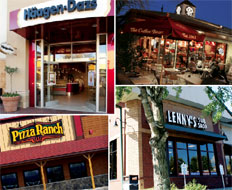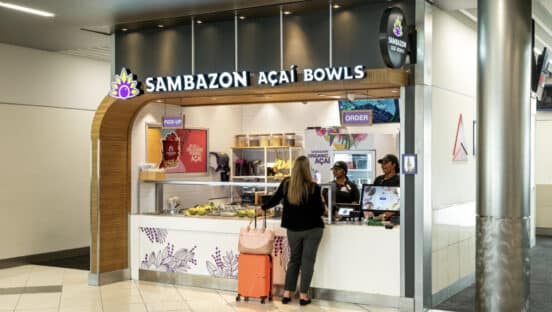Being in the right place at the right time is the key to success in any business. And as the nation finally begins to climb out of one of the worst recessions in U.S. history, a number of quick-service companies are advising their franchisees that, with soft real estate prices, lower construction costs, and increasing availability of capital loans from lending institutions, now is the right time to get growing again—as long as the sites are right.
Although some mature markets never quite lost their allure and ability to command premium prices for retail space, the havoc wrought by the recession has plenty of developers and landlords scrambling for viable tenants. Even property owners who had traditionally held back premium sites for “prestige tenants,” such as high-end jewelry stores, are now more than happy to be able to rent or sell to a high-visibility retail foodservice brand, says Dan Ogiba, director of franchise development for Minneapolis-based Häagen-Dazs Shops.
But Peter Riggs, vice president of the corporate business unit of Pita Pit, says franchisees shouldn’t expect this to be the case for very long. As the economy recovers, he says, real estate prices will begin to rise again—probably not to prerecession highs, but as vacancies begin to be filled, the bargains on premium sites are likely to decrease.
Ogiba says that some of the best buys right now are stores that have been vacated by other foodservice tenants. “There are many good-quality second-generation spaces available in desirable areas,” he says. “We recommend that our franchisees factor into their consideration of these sites taking advantage of previous upgrades in plumbing, power, HVAC, and other up-front investment savings.”
The need for filling premium spots with viable, recognizable brands is making it necessary for many landlords to give away money, in the form of lower rents and reduced tenant contribution requirements, to help defer construction costs and reduce overhead, says Brent Alvord, president of the Memphis, Tennessee–based Lenny’s Sub Shop.
Chains that primarily focus on standalone spaces, such as Orange City, Iowa–based Pizza Ranch, are particularly eager to reap the benefits of vacancies in well-outfitted buildings sitting on well-positioned acreage, says Ryan Achterhoff, chief administrative officer of the pizza-buffet chain.
“Turning the clock back two or three years, we were fighting for prime lot space,” he says. “Now we have our pick from a good selection of foodservice retail-ready space.”
But Casey McEwen, chief operating officer of Atlanta-based Wing Zone, says it’s important for franchisees to keep in mind that the recession isn’t always to blame for an outparcel lot or building vacancies.
“Eighty percent of the time, it’s another reason, often lack of traffic, why the location did not succeed,” he says. No matter how much leeway the landlord is willing to give, McEwen says, these kinds of sites will never be successful.
Before renting or buying, franchisees should also reevaluate areas that might have seemed like goldmines before the recession but, because of unsold new housing and curtailed construction of retail spaces, have lost much of their luster. They should also be open-minded about former B-rated locations that have jumped up to A status because of population shifts and other pro-growth factors.
Even sites that are still perceived as B-level can be good buys for some franchisees. But for first-timers, the low cost of entry could well be canceled out by the costs of trying to develop the site into a destination, Achterhoff says.
McEwen agrees that unless a franchisee is a marketing pro or has very good reason to believe that a location is in the “path of progress”—if he’s privy to information about upcoming area development or traffic pattern shifts that will turn it into an A site in the very near future—he should stick with sites that have already proved themselves to be winners.
For some chains, nontraditional sites are becoming more attractive and affordable. Häagen-Dazs Shops, for example, is shifting a big part of its growth strategy from malls (“We’re already in the majority of the most desirable ones,” Ogiba says) to downtown main streets in major metropolitans. Historically, about 75 percent of Häagen-Dazs Shops have been located in malls and the remaining 25 percent in street locations. Now the company is working toward more of a 50-50 split, and recently opened its first new store in Manhattan in more than a decade.
The Coffee Bean & Tea Leaf, which has looked to international markets for much of its growth, is planning to leverage its global brand recognition and relatively small footprint to aggressively create a presence in underdeveloped domestic markets such as airports, college and university campuses, and hotels, says John Ramsay, senior director of business development for the Los Angeles–based company. “For us, colleges and airports provide incremental sales even if we have retail locations as close as a mile away, because travelers can’t take cups of coffee through security,” Ramsay says. “And on college campuses, people often drink coffee multiple times during the day, but don’t want to move their car to get it.”
To get an insider’s perspective on the existing and future prospects for a new site, Robert Streett, senior vice president of strategic development for Salt Lake City–based Mrs. Fields Famous Brands, recommends franchisees begin their site selection process by consulting with a local real estate broker who “knows the nuances of the specific market.”
“We have also partnered with Buxton, a high-tech marketing analytics firm, to help us pinpoint the exact locations where our customers are and their buying habits,” Streett says.
But even the latest, state-of-the-art technology can’t tell the whole story about whether a site is right, says Eric Newman, executive vice president of Charlotte, North Carolina–based Bojangles’.
“Site selection is still more art than science, so make sure to make multiple visits to any location before you lease, if it’s the place you want to—and should—be,” he says.







